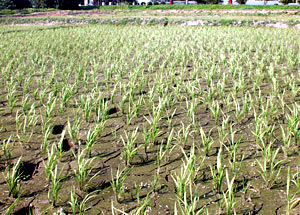South China's island province of Hainan's anti-drought department warned this week that the drought in Hainan has reached a serious level.
The island's drought has lasted since the beginning of this year and more than 45 percent of the region's farmland and 64 of the middle and small rivers have dried up.
The province divides the drought situation into four grades, and this year's drought has reached the second worst level.
The decrease of underground water has resulted in reverse flow of sea water into the province's main river, the Wanquan River, which now has about eight kilometers of salty water. Nearly 26,700 rural people from 208 villages along the river are having difficulty obtaining drinking water and about 1,766 hectares of farmland lacks water resources.
To solve the drought problem, the provincial department issued Hainan's first anti-drought scheme earlier this week. This gives specific directions for anti-drought measures at different grades. The scheme will go into effect March 1st this year.

According to the department, the scheme can only be launched when the province's drought situation reaches the second most serious grade.
The scheme said when the province is in serious or most serious drought, all local governments should ensure essential water demand for daily life and key industries.
At the same time, daily water supply to urbanites will be controlled, limiting water use to 100 liters per person, said the scheme.
In case of an emergency, the sealed underground water can also be used and relevant water power stations can be closed, said the scheme.
The provincial weather department forecasts that Hainan will see limited rainfall before May. As a result the underground water storage will continue to reduce by 50 million cubic meters each month.
The provincial government is increasing financial support to the drought-hit areas. After the first sum of ten million yuan allocated to local governments last November, eight million yuan additional anti-drought fund was also distributed to the drought-hit areas earlier this month.
(Xinhua News Agency February 26, 2005)

